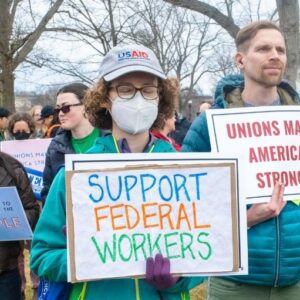April 6, 2005
Burrus Testimony: Bioterrorism Safeguards Remain Inadequate
A Government Accountability Office assessment of anthrax detection methods “underscores the lack of confidence” that many workers have in testing procedures at postal facilities, APWU President William Burrus said in testimony April 5 before a House subcommittee.
“The fears postal workers harbor about the accuracy of anthrax testing following the October 2001 attack remain,” Burrus testified, “and they will not be overcome until a comprehensive plan of detection and protection is put in place.” The GAO report suggests that the system still needs to be improved, and “confirms that many of the concerns the APWU expressed in 2001 were well placed.”
The testimony came during a hearing before the House Subcommittee on National Security, Emerging Threats and International Relations. “Some time ago, we were told critical gaps remained in detection, sampling, and data analysis protocols for biological contaminants like anthrax,” said subcommittee Chairman Christopher Shays (R-CT) in explaining why the panel had asked the GAO to study anthrax detection policies.
Burrus restated his belief that the Postal Service acted appropriately in the immediate aftermath of the fall 2001 attack, citing its reliance on the advice of public health officials and its communications with postal unions as critical decisions were being made.
“In the weeks and months that followed, however, serious errors were made – errors that could have been avoided.” The GAO draft report, Burrus testified, reinforces longstanding APWU concerns related to those errors.
“In response to GAO recommendations to reassess postal facilities that had previously tested negative, the Postal Service asserted that because there had been no additional incidents of anthrax-related illness or death there was little or no risk to postal workers or the public. Despite our request, the Postal Service declined to conduct further tests.
Burrus said the APWU strongly disagreed with the Postal Service’s rationale and the decision not to conduct additional tests, declaring, “No one can reasonably suggest that our members should serve as the ‘canaries in the coal mines’ of years past.
“The absence of illness or death cannot serve as proof that all is well,” Burrus said. “The buildings and their contents must be tested and declared free of agents of bioterrorism.”
“The APWU – and the GAO,” Burrus said, “reject the premise that ‘following the mail and monitoring employees’ can serve as a means of determining contamination. This is unacceptable and should not be permitted by the Congress of the United States.”
Testifying for the Postal Service, Thomas G. Day, vice president of Engineering, said that the agency is “continuing to improve its processes to protect our employees and our customers from biohazards.” Day largely agreed with the GAO recommendations, but defended the USPS policy on targeted sampling, or “following the mail.” The subject prompted extensive questioning by Shays and by Rep. Eleanor Holmes Norton (D-DC).
Burrus also decried the fact that a Biodetection System (BDS) machine has not yet been installed at the V Street facility in Washington, DC, which handles government mail.
APWU Members Strike Private Mail-Haul Firm
About 170 APWU truck drivers who work for Mail Contractors of America have been on strike for two weeks in Des Moines, Kansas City, KS, and Jacksonville, FL.
Union members are picketing terminals in those cities because of unfair labor practices by the privately-owned MCA, and the company’s refusal to come to the bargaining table.
Drivers are demanding an end to policies the company imposed in September that reduced their pay by up to $10,000 per year.
The Des Moines APWU has asked for financial support, as well as support on the picket line — John Edwards, the Democrat’s vice presidential candidate last year, gave a boost when he walked the picket line with them April 1. Contributions should be sent to: APWU/MCA Strike Fund, Local 44, 1200 E. Euclid Ave, Des Moines, IA, 50316.



